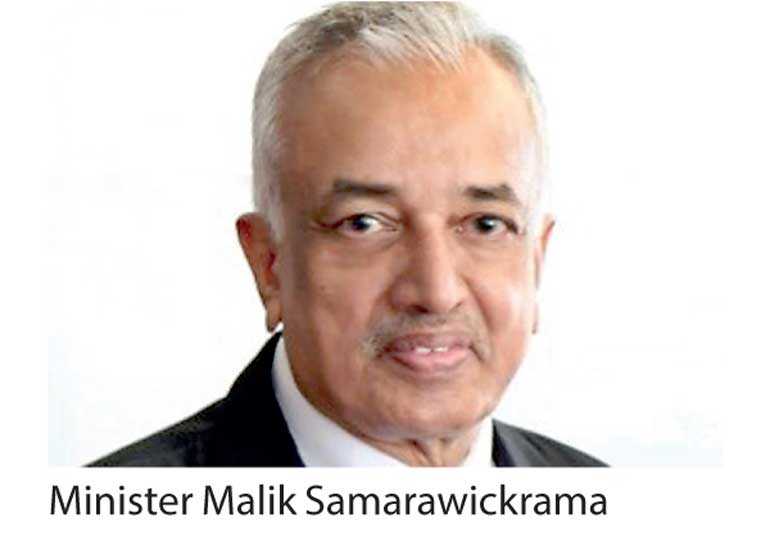Monday Feb 16, 2026
Monday Feb 16, 2026
Wednesday, 23 May 2018 00:10 - - {{hitsCtrl.values.hits}}
 By Skandha Gunasekara and Ashwin Hemathagama
By Skandha Gunasekara and Ashwin Hemathagama
The Government aims to attract foreign direct investments to the tune of $ 2.7 billion in the first half of 2018, Development Strategies and International Trade Minister Malik Samarawickrama told Parliament yesterday with $ 1.3 billion approved in the first four months.
“In 2018, the BOI has approved projects up to a value of $ 1.348 billion for the last four months.
In the next one and half months, before 30 June, there will be FDI projects worth $ 1.4 billion that will be approved by the BOI,” Minister Samarawickrama added.
The Minister made these remarks while opening the debate on the two orders under the Strategic Development Project Act, adding that Sri Lanka attracted $ 1.9 billion in FDIs in 2017.
He said that the Board of Investments had already approved these investment projects for 2018, including two LNG power plants, an offshore LNG platform and a cement factory.
“Both India and Japan will invest in these projects,” he said.
Referring to the recently signed free trade agreement with Singapore, the Minister said that no movement of persons from Singapore had been opened in professional services under the agreement (SLSFTA).
“With regard to the trading services, certain professional associations have expressed their concerns about the influx of professionals and other workers into the country. The movement of persons from Singapore has not been opened up under the Singapore-Sri Lanka Free Trade Agreement except for intra-corporate transferees in very senior management and business visitors linked to investments,” he said.
The Minister asserted that the FTA had received the approval of both the Cabinet of Ministers and the Attorney General before it was entered into.
Elaborating on “corporate transferees”, the Minister said that these transferees would be from Singaporean companies with an investment in Sri Lanka, limited to senior positions such as managers, executives and specialists of various fields.
He explained that “corporate transferees” were transferees from a branch of a Singaporean company with an investment in Sri Lanka and were also limited to managers, executives and specialists.
“Business visitors will be permitted for a period of not more than 30 days for purposes such as market scoping, business agreements and so on. The corporate transferees’ period of staying is also initially limited up to two years. No movement of persons, either Singapore citizens or permanent residents, has been opened in the professional services sector,” he stressed.
The Minister refuted claims that the FTA would result in a wave of non-citizens of Singapore arriving in the island in droves.
“These claims are absolutely not true. The FTA does not permit any permanent resident to work in Sri Lanka. Corporate transferees, who arrive in Sri Lanka, can only work for that particular Singaporean company which they are employed at. Even the movement of permanent resident holders arriving in Sri Lanka is extremely limited and their entry would be tied to a corresponding investment in Sri Lanka,” he observed.
He then said that the engineering and architectural sectors have not been opened either, noting that Sri Lanka had not undertaken any liberalisation surpassing the current investment policies.
“The claim that the engineering and architectural services have also been opened is completely wrong. The only commitment is for cross-border services, and that is only through the use of internet and not relating to the movement of people. This is happening even now and already possible through existing regulations and administrative framework. That has also been limited to a pre-designed advisory and consultative service and does not include the practices of the architectural or engineering profession. Therefore, establishing a company for providing these advisory services in the country or movement of persons to provide such services has not been permitted under the agreement. It should be emphasised that Sri Lanka has not undertaken any liberalisation exceeding the prevailing investment regime,” the Minister explained.
“If a person has ‘dominant and effective nationality in a third country’, such persons have also been excluded under the agreement. Therefore Singaporean companies cannot hire and send citizens of another country to work in Sri Lanka,” he clarified.
The Minister vowed to keep professional bodies, trade chamber and trade associations informed of the negotiations of Free Trade Agreements, pointing out that it was part of the Government’s trade policy to enter into FTAs with selected nations.
The Minister welcomed constructive dialogue with trade chambers and professional bodies, and invited them to point out if they found anything amiss with the agreements. “We have a period of one year after which a review can take place, and if there is anything wrong in the agreement we can make amendments,” he said, calling on trade chambers and professional bodies to engage in constructive dialogue with the Government on such matters.
Furthermore, the Minister assured Parliament that the SLSFTA had no impact on the Government’s revenue.
“Import tariffs on petroleum and gold have not been removed under the FTA. The trade liberalisation program has been in consultation with the Finance Ministry. As at present, imports from Singapore are about $ 1,293 million, out of which $ 750 million was petroleum products and $ 228 million was gold. These tariffs have not been removed,” he affirmed, while remarking that no transshipment of goods would be allowed according to the agreement.
Additionally, the Minister said that new regulations specifying the processes to be followed when employing foreign nationals would be submitted to the Cabinet of Minister for approval in the next two weeks.
Accordingly, the new regulations, proposed under the Immigration and Emigration Act, would resolve the concerns expressed by professionals and relevant parties regarding the employment of foreign nationals in Sri Lanka.
“The draft regulations have mentioned the categories of employment, employer and employee obligations, and the roles to be played by the professional bodies on recognition of qualifications. These will strengthen the regulatory framework,” he added.